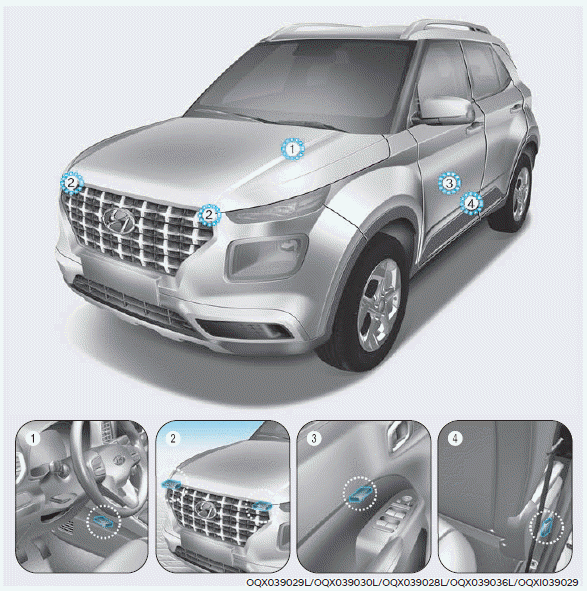Hyundai Venue: Engine Control System / Knock Sensor (KS). Description and operation
Hyundai Venue (QX) (2020-2025) Service Manual / Engine Control / Fuel System / Engine Control System / Knock Sensor (KS). Description and operation
| Description |
Knocking is a phenomenon characterized by undesirable vibration and noise and
can cause engine damage. Knock Sensor (KS) is installed on the cylinder block
and senses engine knocking.
When knocking occurs, the vibration from the cylinder block is applied as pressure
to the piezoelectric element. At this time, this sensor transfers the voltage
signal higher than the specified value to the ECM and the ECM retards the ignition
timing. If the knocking disappears after retarding the ignition timing, the
ECM will advance the ignition timing. This sequential control can improve engine
power, torque and fuel economy.

 Camshaft Position Sensor (CMPS). Repair procedures
Camshaft Position Sensor (CMPS). Repair procedures
Inspection
1.
Check signal waveform of CKPS and CMPS using a scan tool.
Specification : Refer to "Waveform"
Removal
•
DON’T remove the camshaft position sensor during engine running
or right after engine stops, or a scald by the flowed out engine
oil may occur...
Other information:
Hyundai Venue (QX) (2020-2025) Service Manual: Rear Wheel Speed Sensor. Repair procedures
Removal [Rear Drum Brake Type] 1. Loosen the wheel nuts slightly. Raise the vehicle, and make sure it is securely supported. 2. Remove the rear wheel and tire (A) from the rear hub...
Hyundai Venue (QX) (2020-2025) Service Manual: Curtain Airbag (CAB) Module. Repair procedures
Removal 1. Disconnect the battery negative cable and wait for at least 3 minutes before beginning work. 2. Remove the roof trim. (Refer to Body - "Roof Trim Assembly") 3...
Categories
- Manuals Home
- 1st Generation Venue Owners Manual
- 1st Generation Venue Service Manual
- Rear Combination Light Bulb Replacement
- To set Cruise Control speed
- Liftgate
- New on site
- Most important about car
Air bag collision sensors
WARNING
To reduce the risk of an air bag deploying unexpectedly and causing serious injury or death:
Do not hit or allow any objects to impact the locations where air bags or sensors are installed. Do not perform maintenance on or around the air bag sensors. If the location or angle of the sensors is altered, the air bags may deploy when they should not or may not deploy when they should. Do not install bumper guards or replace the bumper with a nongenuine HYUNDAI parts. This may adversely affect the collision and air bag deployment performance. Place the ignition switch in the LOCK/OFF or ACC position when the vehicle is being towed to prevent inadvertent air bag deployment. Have all air bag repairs conducted by an authorized HYUNDAI dealer.
Copyright © 2025 www.hvenueqx.com

